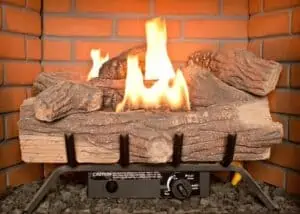What Causes Black Soot From a Propane Fireplace?
Having black soot in a propane fireplace can be dangerous. This black residue is produced by the gas molecules not burning completely and can be a source of respiratory irritation and environmental pollution. Fortunately, there are several tips that can help reduce soot and its associated hazards.
(Searching in Google “certified gas fireplace technician“? Contact us today!)

Getting a good burn involves the proper mix of air and fuel. If there are too many embers in the burner, or if the embers are not well placed, the resulting burn may be inefficient. This may result in soot, as well as black powder build-up on the fireplace insert. If you have a gas log set that is covered in soot, you may need to swap out the embers or add some sand to the burner. Similarly, installing a ventless gas log may also help reduce soot.
It is also possible to build up soot in a propane fireplace, even if it is not black. This can result from an improperly fitting gas regulator, which may allow too much or too little gas into the fireplace. Another cause is a clogged burner port or an old burner set. These problems can cause a gas fireplace to produce a less efficient burn, resulting in more soot.
There are also many other ways that soot can get into your propane fireplace, and the best way to avoid soot is to keep your fireplace clean. A fireplace cleaner that is approved by the manufacturer may help to remove excess soot, but a clean chimney is best. If you are using a gas fireplace, make sure that the gas is turned off before you begin any cleaning process. This will prevent an explosion and keep you safe.
In addition to cleaning the gas fireplace, you can also clean the burner pan or air vents to prevent soot from forming. You may need to purchase a brush or rag for this task, and it may be a good idea to test the cleaner in a small area first. You will want to use a cleaner that is specifically designed for cleaning propane, as the wrong cleaners may damage your propane fireplace or even cause a fire.
Having a properly functioning gas fireplace is important, but if you find that your fireplace is not burning efficiently, you will need to look into what may be causing the problem. There are several different factors that can affect how efficient a propane fireplace is, including the type of gas used in the fireplace, the quality of the gas, and the location of the burner.
In addition to black soot, a propane fireplace may produce a mix of gases, such as carbon monoxide, which is dangerous. Carbon monoxide is the byproduct of burning propane and can cause respiratory problems and even cancer. Fortunately, it is easy to remove this dangerous vapor from your home.
As long as you follow the directions on your gas fireplace’s rating plate, you should be able to avoid black soot from occurring. However, if you do find that it does occur, it is a good idea to have a professional take a look at the unit. Depending on the severity of the problem, you may need to replace parts or perform a complete service on your unit.

